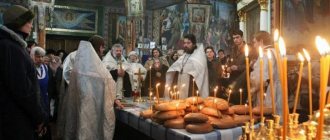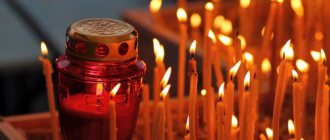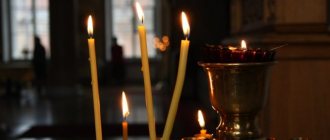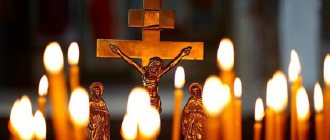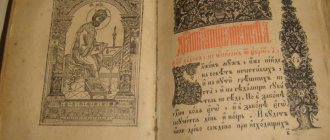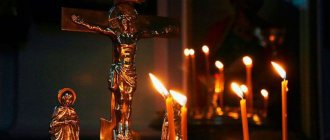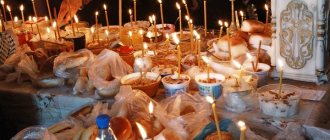The history of the concept of “40 days” as sacred begins in biblical times. The mentioned period is often found in Church Tradition - it is necessary to prepare oneself for the worthy acceptance of a special gift from the Lord and receiving His gracious help.
Thus, the conversation of the prophet of God Moses with the Creator on Mount Sinai and the receipt of the tablets of the Covenant from Him was preceded by a 40-day fast.
Next, the Israelites mourned the death of Moses for 40 days; The prophet Elijah walked for the same amount of time to Mount Horeb. But it becomes more understandable that the Son of God ascended to heaven also on the 40th day after His Resurrection.
Perhaps all this together predetermined the Church’s establishment of a special commemoration of the newly deceased precisely on the 40th day after their departure.
Why remember?
The soul of the newly deceased, having appeared before the Heavenly Father on the 9th day and having not yet received a final decision regarding its future fate, is sent to the air ordeal.
What are they? On this path, all sorts of obstacles will arise from the sins committed by the deceased during his lifetime, and representatives of dark forces will try to attract him to themselves. The soul, accompanied by a guardian angel, must overcome them, proving that the deceased has much more good deeds and they outweigh everything “incriminated” by the dark forces.
When to commemorate?
Prayers will help the deceased find peace. Forty days are counted from the date of death, i.e.
it is the first day of the countdown (to midnight). If a person died at night and it happened after midnight, the date of death will be considered the coming day. Is it possible to commemorate earlier/later? In the temple you need to do this every day. As for the wake in the sense of a funeral dinner, it is permissible to organize it at any convenient time - either earlier or later than this date, because for the newly deceased the main thing is not the table laid, although in his memory, but timely warm prayer.
There are opinions that if fortieth day falls on Sunday or Monday, then commemoration cannot be done on these days. Such attitudes are unfounded, especially since the Divine Liturgy is served in churches on Sunday, and this is the best way of commemoration. As for Monday, if liturgies are not served daily in the nearest church, then a lithium or memorial service can be specially ordered on that date.
How to hold a funeral earlier or later: recommendations from the church
In the old days, they believed that if a wake was held ahead of schedule, the deceased would certainly come to a relative in a dream to ask him to complete unfinished business. However, few people believe in superstitions in the modern world, but holding a wake ahead of schedule is still not worth it for objective reasons: since the deceased was still alive.
Most priests are unanimous in the opinion that it is necessary to remember the dead only on the allotted days, or dates, which are allotted by the church. When the burial is carried out, the soul is left alone in the afterlife, and the prayers of relatives, their warm words and memories, will help it overcome the difficult path to purification and enlightenment. Therefore, it is desirable that prayers from relatives be heard precisely on the day when the soul goes through the most important stages of the afterlife for it.
Types of commemoration
How to remember for 40 days after death? Christians are remembered:
- praying for the repose of their souls - in church and at home,
- a special meal organized for this occasion,
- alms.
As a rule, the magpie about the newly deceased is ordered on the day of death, and from that day on, the deceased is commemorated daily in the church. It’s good to order a new magpie after the expiration date.
There is also such a prayer as the Indestructible Psalter. Such prayer is ordered in monasteries; the nuns read the Psalter throughout the day, replacing each other. During the day, in many churches the Psalter is read in the same way by parishioners; such reading can also be ordered for the purpose of commemoration.
Deeds of almsgiving and helping others are very beneficial for the soul.
Orthodox tradition provides for the distribution of the deceased's belongings not after, but before 40 days. They must be given to those who need it, and asked to pray for the one who has passed on to another world. Such an action will be counted in his “asset” as a good deed.
On the forties, it is customary to visit the cemetery, bring flowers to the grave, light a candle or lamp, and pray.
Is it normal to hold a wake for the deceased on Sunday?
The priests claim that the popular opinion about the ban on holding funeral services on this day is unfounded.
It is classified as a superstition. The Church does not prohibit commemorating the dead on days off. Funerals can be held at any time of the year. The only Sunday of the year when holding a memorial event is prohibited is Easter.
Commemorating the deceased on Sunday means praying for the deceased, submitting notes in the church on Sorokoust for the deceased, and ordering memorial services. The ceremony can be performed on any day on which mourning falls. After visiting the church, it is advisable to hold a funeral meal.
The clergy talk about the need to pray fervently and remember the deceased. You are welcome to order a memorial service on the day of burial and on the 3rd, 9th and 40th days. We are talking about a church service for the newly deceased.
After the funeral, an order is made in the church for a prayerful commemoration - Sorokoust.
There is a custom for relatives to gather at the funeral table after the funeral ceremony. The Church does not prohibit performing the ritual on Sunday. Welcomes the general prayer of those present to remember the soul of the deceased.
Funeral dinner
You can invite a priest to the funeral. The service in the temple took place. The funeral dinner is considered a continuation of the divine service, and therefore should be held at a decent level.
The commemoration of the fortieth day, like the ninth, is called “uninvited.” They are not invited, people come who want to pay their last respects to the deceased.
If, as a rule, relatives and close friends gather for nine days, then colleagues, neighbors, and acquaintances can come to honor the memory of the forties.
Quite often, this mournful event turns for many acquaintances into an opportunity for a “general gathering”, where they can exchange news and pressing problems. At the same time, it is forgotten that the Orthodox should pray for the deceased at the funeral table.
If a priest is invited to dinner, he will serve a short funeral prayer service and say a few edifying words as a sermon. If the gathering is purely lay, then prayers for the deceased should still be heard. If it is not possible to read the litia yourself, then, as a last resort, let it be at least the 90th Psalm and “Our Father.” Church candles should be lit during prayer.
At a wake, it is a good idea to make a speech about the qualities and merits of the deceased, and after that, honor his memory with a minute of silence.
The funeral speech, although sad in tone, should not show hopelessness.
Let the main motive be: yes, man has left us, he is not on this earth, but he does not cease to exist, he is just now in a different form and in a different world.
Alcohol should be avoided during the funeral meal, even if the newly deceased himself was, as they say, not a fool to drink - there is no point in aggravating his sin.
In what cases can the date of a funeral be moved?
You can postpone the date of the funeral if there are serious reasons:
- The date falls on a weekday, and relatives cannot come at the appointed time.
- The date falls on a major Orthodox holiday.
- One of the close relatives is ill, or has another equally compelling reason for postponing the date of the funeral.
- Birth of a child or christening.
One of the most common reasons for rescheduling a funeral is work that cannot be rescheduled. The church is loyal to postponing the memorial date for the deceased, and recommends that on this day, distribute refreshments to surrounding people and order a memorial service for the deceased in the church.
Strict prohibitions on remembering the deceased are reserved for days such as Holy Week of Lent, Christmas, and Easter. These holidays are associated with the birth and resurrection of Jesus, and all the attention of Orthodox believers is directed to these bright holidays. Therefore, priests recommend moving the commemoration to January 8 or Radonitsa, which comes a week after Easter.
Radonitsa is a sacred holiday for all Orthodox Christians, which is set aside to remember deceased relatives. On this day, the church encourages believers to attend a memorial church service and visit the graves of the deceased, bringing them offerings in the form of sweets, cookies, and Easter eggs. On this day, it is customary to tie a towel around a men’s monument, and a headscarf around a women’s monument. Afterwards, the product must be removed and given to a stranger, saying the name of the deceased.
Table: what should be on it?
The very first - and traditional - funeral dish is kutia. Grain (in this case, boiled rice or wheat) is revered as a symbol of resurrection, and honey and raisins added to porridge are the sweetness that the righteous will enjoy in the Kingdom of God. Kutya is traditionally consecrated in the temple during a memorial service, but sometimes, if for some reason this was not possible, it is sprinkled with holy water.
Dishes for the funeral table have also been traditional since ancient times. In addition to kutya, this is fish in all forms. Also present on the table:
- Funeral lunch. sandwiches with herring or sprats;
- beet salads, including vinaigrette;
- fish aspic;
- baked fish;
- cabbage rolls;
- cutlets or zrazy with mushrooms;
- peppers stuffed with vegetables and mushrooms;
- butter pancakes;
- various pies.
The funeral table includes any of the following drinks:
- kvass;
- jelly - berry or oatmeal;
- compote;
- lemonade;
- fruit drink;
- sbiten;
- juice.
Does the Church remember everyone?
There are several categories of dead people who should be remembered in church; funeral services are not allowed for them , regardless of the period of their departure. This applies to:
- suicides;
- those who left while intoxicated (alcohol or drugs);
- unbaptized.
Suicides cannot be commemorated in church.
God's most important gift is life. And if someone arbitrarily decided to neglect him, then the Church does not have the right to remember him as a believer or serve prayer services for him. You can pray for such a person privately (but with the blessing of your confessor); it is useful to give alms in memory of him. However, there are situations when a mentally ill person or a person who was driven to the brink by oppression and bullying (say, in the army or prison) commits suicide. Then the ruling bishop, upon written request, can bless the funeral service and commemorate him.
The use of alcohol and drugs is a grave sin; in fact, it is the same suicide extended over time, and it is unacceptable to remember a sinner who died in such a state.
As for the unbaptized, the Church does not have the right to remember them, because they were not its members: they were not reborn to a new, spiritual life through the Sacrament of Baptism, they were not united with our Lord Jesus Christ in the Sacrament of Communion, and therefore cannot inherit those benefits what He has promised to those who love Him.
Orthodox Christians can ease the fate of the souls of those who have passed away unbaptized (as well as stillborn babies) with home prayer - St. to the martyr Uar, who received the gracious gift from the Almighty to be a representative for those who were not worthy of Holy Baptism:
“Oh, venerable holy martyr Uare, we kindle with zeal for the Lord Christ, you confessed the Heavenly King before the tormentor, and you suffered earnestly for Him, and now the Church honors you, as you are glorified by the Lord Christ with the glory of Heaven, Who has given you the grace of great boldness towards Him , and now you stand before Him with the Angels, and rejoice in the Highest, and clearly see the Holy Trinity, and enjoy the light of the Beginning Radiance, remember also our relatives' yearning, who died in wickedness, accept our petition, and like Cleopatrine, the unfaithful race was freed from eternal torment by your prayers You, therefore, remember those who were buried against God, who died unbaptized, striving to ask for deliverance from eternal darkness, so that with one mouth and one heart we may all praise the Most Merciful Creator forever and ever. Amen".
According to Orthodox views, the third, ninth and fortieth days after a person’s death are especially significant for his soul. However, it is the latter, in comparison with other “memorial dates”, that is most important. During this period, having gone through all the aerial ordeals, the soul ceases to be newly departed.
For her, in this third meeting with God, her future place of residence will already be determined based on her deeds - until the Last Judgment. And the day of waiting for this decision seems to be a date more tragic than even physical death. Therefore, memorial prayers for the deceased, for the determination of their souls “in a greener place, in a cooler place, in a calm place” are the Christian duty of all believers.
